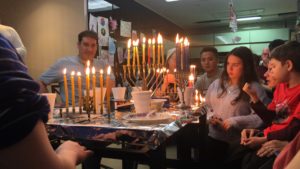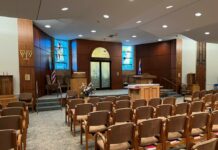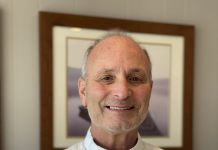
It’s approximately 6,888 miles from Elkins Park to Seoul, South Korea — the distance that a handful of red cover-bound “Gates of Repentance” High Holidays siddurim traveled from Reform Congregation Keneseth Israel to Cheltenham native Tamar Godel’s tiny Seoul apartment.
Since about 2018, Godel and a handful of other Jews — a unique amalgamation of expats and immigrants, all referred to as “foreigners” by native South Koreans — have used the prayer books to conduct Rosh Hashanah and Yom Kippur services that combine the diverse rituals of its participants with the landscape of the South Korean metropolis.
Many of the traditions of the group, dubbed Hakehillah Korea, or the congregation of Korea, share this blending of tradition and environment: Members throw breadcrumbs into the Han River for tashlich; co-founder Anna Toombs hosts Passover seders in her office, the only other space she has access to with a kitchen and more square footage than her postage stamp-sized apartment to host guests.
Though a small group of about 30, Hakehillah Korea has come to define itself by its lack of singular ritual or belief system. Member numbers fluctuate; some, like Toombs, are in the process of becoming a South Korean citizen, while others are visiting the country for a fellowship.
The congregation has no membership dues, no synagogue, no budget, no denomination. Though Hakehillah lacks a static identity, its members are determined to keep it going, even after they’re gone.
Godel and Toombs had no plans of building a Jewish community when they first arrived in Seoul.
“I feel like both of us turned around one day, and we were like, ‘How did we even get put in charge of this synagogue?’” Godel said.
Godel arrived in Korea in 2015 with plans to teach English and make enough money to pay off her student loans from Temple University. Her parents were both well-traveled and encouraged their children to go abroad whenever the opportunity arose.
Godel was also meant to be a teacher, she said. Before she received her Hebrew teaching certification from Gratz College, she was the religious school teacher at Keneseth Israel, where her mother worked and where her grandfather, Simeon Maslin, was rabbi for 17 years.
Leading Jewish community was always how Godel connected with her Judaism and, upon arriving in Seoul, she attended Chabad on the High Holidays to maintain that connection.
Like some other future Hakehillah members, Godel did not click with Chabad, at the time the only Jewish community in Seoul. She had a different way of practicing Judaism than Chabad and found they did not share the same values at times.
When Godel’s effort to pay off her loans was prolonged, she decided to stay in Korea longer than intended, and if she was going to stay, she was going to find a way to make the best of her situation.
“If I have the opportunity to be here long enough, to do better than Chabad, why shouldn’t I do it?” she said.
She and Toombs, a Minnesota native who was also teaching English, fell into leading HaKehillah. They had both attended a Shabbat at a Jewish woman’s house, which quickly transformed into frequent coffee meet-ups and dinners.
“You would just go to [our friend’s home], and there are other young Jewish adults who were awesome, and you would talk late into the night; you would stay over; you would talk all Saturday. It was really lovely,” Godel said.
When that young family moved back to the U.S. in June 2017, Godel, Toombs and the other young Jews were on their own. That December, they hosted Hakehillah’s first Chanukah party.
For the past four years, the group has continued to hold programming, getting funding from Hakhel grants from Israel’s Ministry of Diaspora Affairs and from ALEPH Alliance for Jewish Renewal and the National Center to Encourage Judaism. They are sorting out their High Holiday plans, which have shifted every year due to the pandemic and Korean laws, which dictate that no one can have religious exemptions and take time off from work for holidays.
The Hakehillah members are working on their own Haggadah, which, beyond its purpose during Passover, will serve as an instructional manual and guide for the next generation of Jews in
South Korea.
Within the congregation, there are already six young Korean Jews, all 18 or younger, many of whom are the children of one Korean and one white, Jewish parent. The hope is that when Godel, as well as many other members, return to the U.S., this next generation of Hakehillah members can pick up the Haggadah — written in English, Hebrew and Korean — and adapt it to accommodate what their community needs years from now.
“Our space is very well defined,” Toombs said, “But it’s also vague enough that whoever takes it over next can decide the flavor, the identity of how it’s run.”






